Literature Review: Mental Health Challenges Faced by Nurses in the UK
VerifiedAdded on 2023/06/18
|20
|8917
|241
Literature Review
AI Summary
This literature review delves into the multifaceted issue of poor mental health among nurses in the UK, examining the causes, impacts, and potential solutions. It identifies key themes such as the impacts of mental health challenges on healthcare workers, the specific causes of poor nurse mental health in the UK (including excessive workload, stressful work conditions, lack of resources, and disturbed schedules), and the roles of managers in supporting staff with poor mental health. The review synthesizes various perspectives, highlighting the importance of addressing factors like staff turnover, work-life balance, patient cooperation, and the need for adequate resources to improve the well-being of nurses and, consequently, the quality of patient care. Desklib provides students access to more solved assignments and study resources.
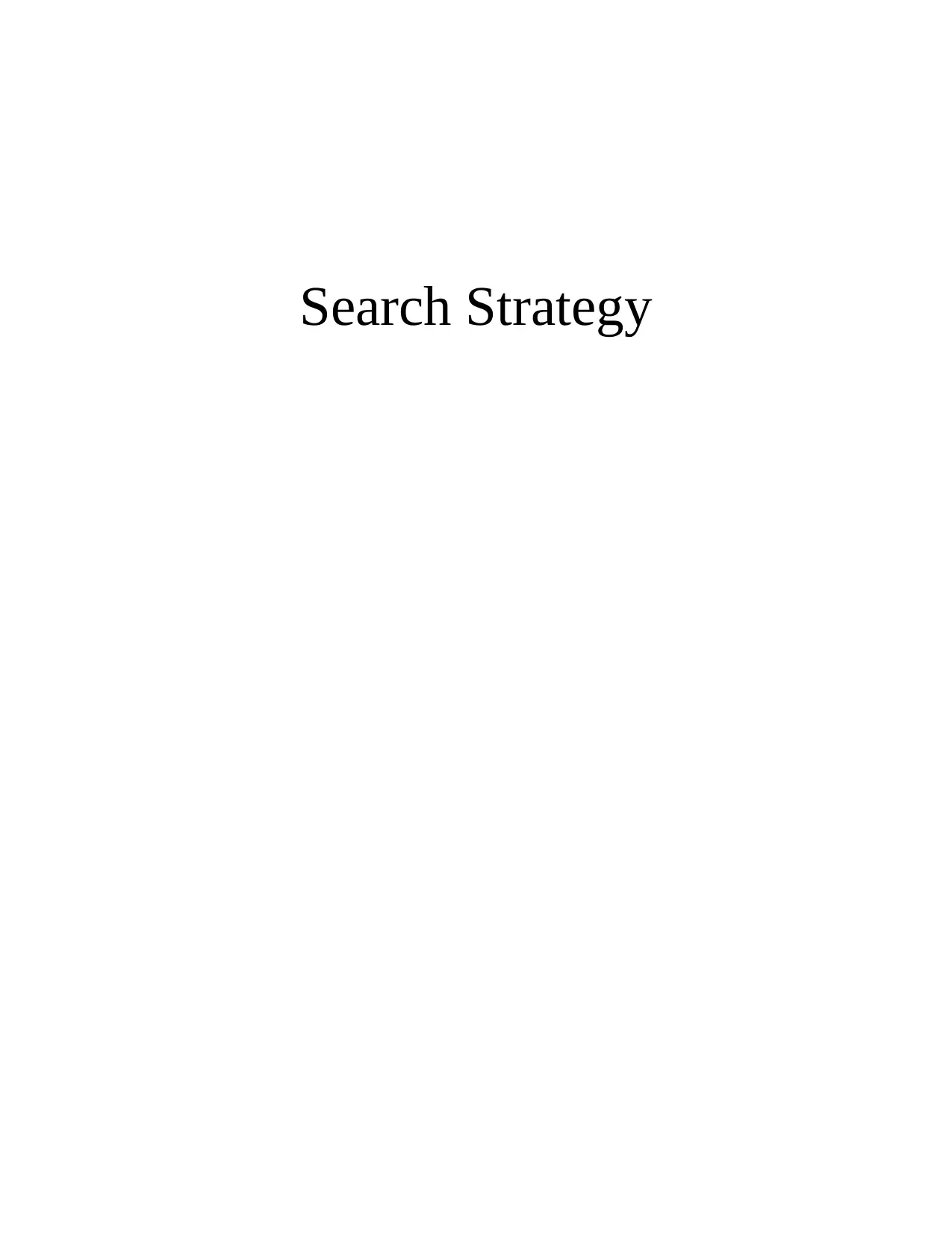
Search Strategy
Paraphrase This Document
Need a fresh take? Get an instant paraphrase of this document with our AI Paraphraser
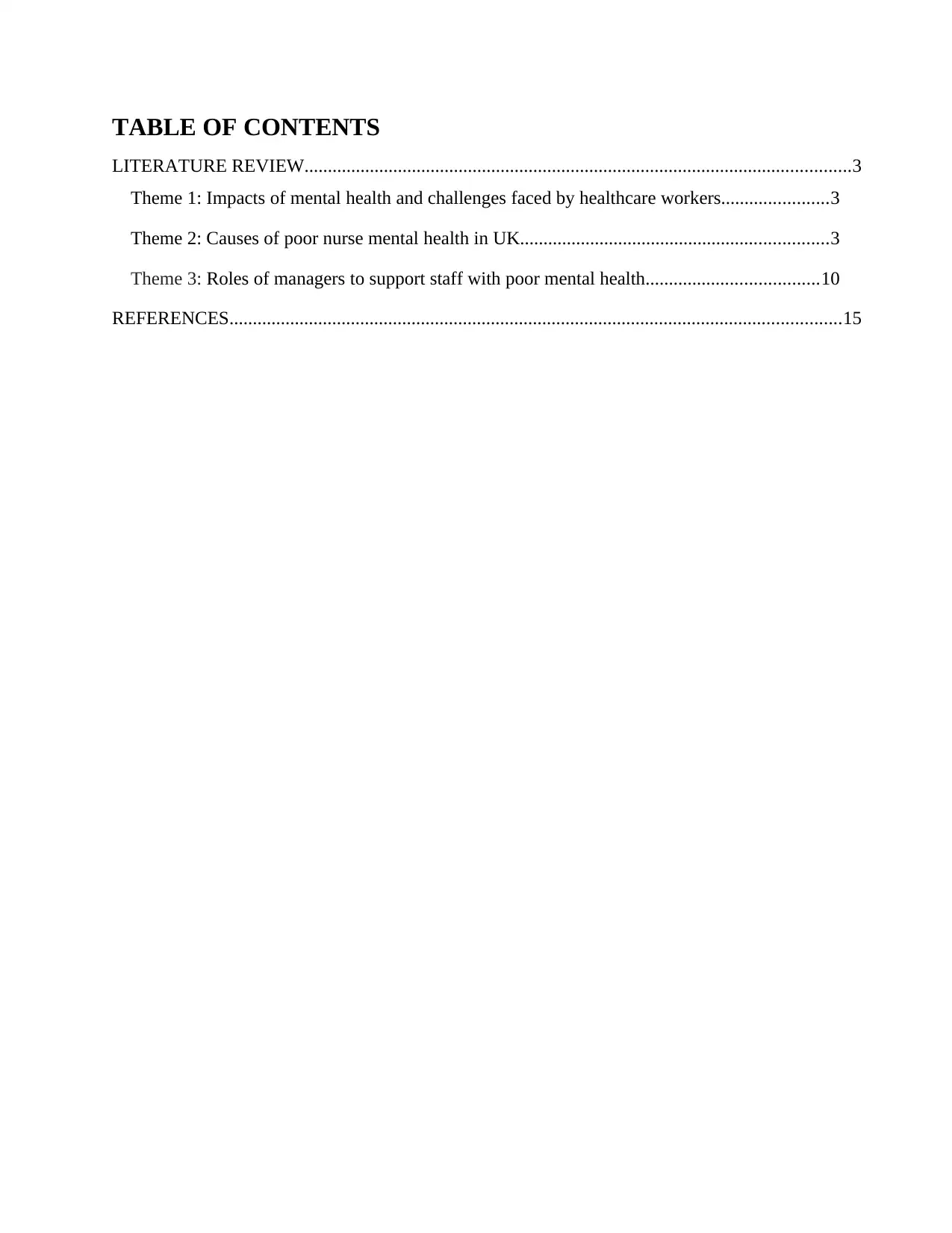
TABLE OF CONTENTS
LITERATURE REVIEW.....................................................................................................................3
Theme 1: Impacts of mental health and challenges faced by healthcare workers.......................3
Theme 2: Causes of poor nurse mental health in UK..................................................................3
Theme 3: Roles of managers to support staff with poor mental health.....................................10
REFERENCES...................................................................................................................................15
LITERATURE REVIEW.....................................................................................................................3
Theme 1: Impacts of mental health and challenges faced by healthcare workers.......................3
Theme 2: Causes of poor nurse mental health in UK..................................................................3
Theme 3: Roles of managers to support staff with poor mental health.....................................10
REFERENCES...................................................................................................................................15
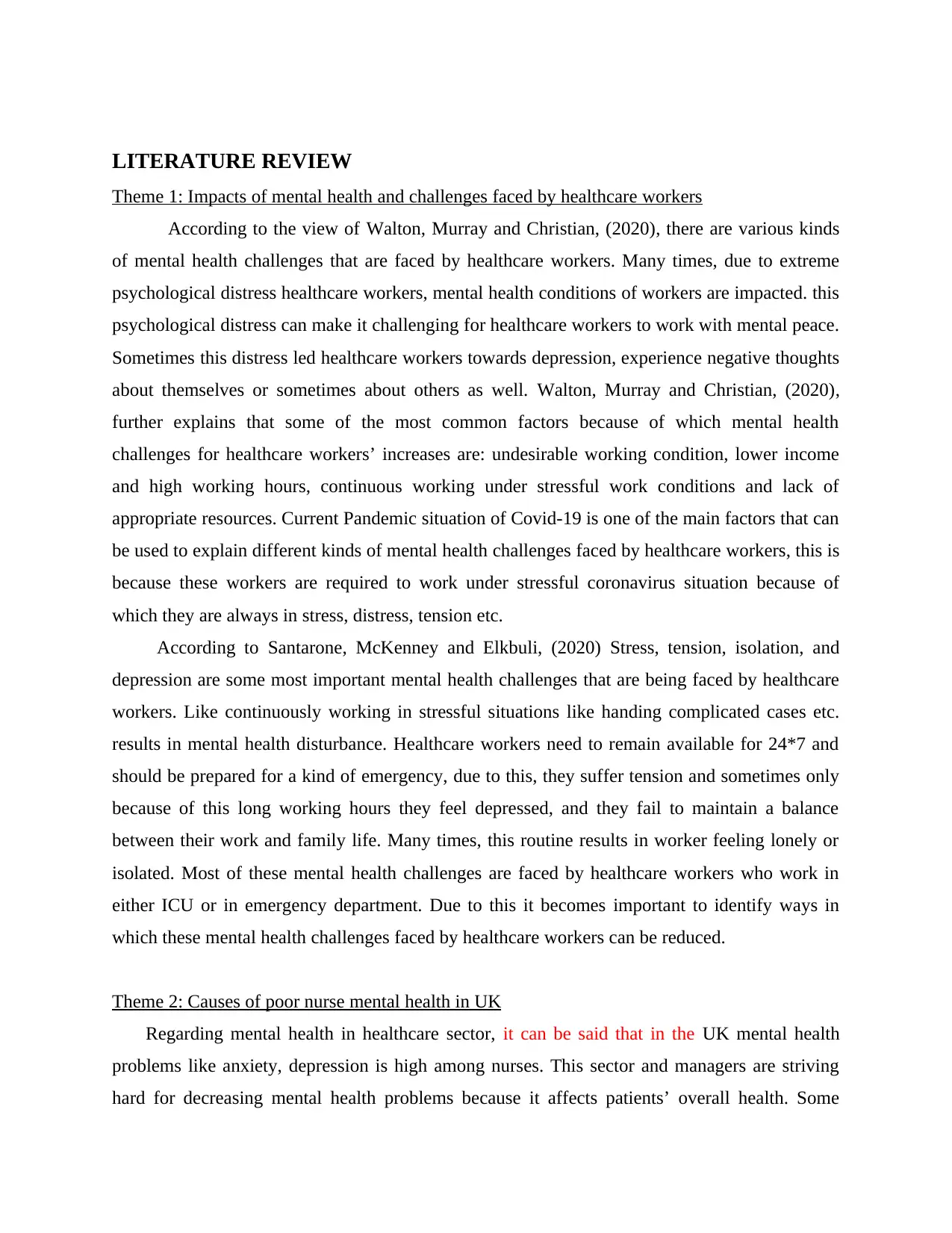
LITERATURE REVIEW
Theme 1: Impacts of mental health and challenges faced by healthcare workers
According to the view of Walton, Murray and Christian, (2020), there are various kinds
of mental health challenges that are faced by healthcare workers. Many times, due to extreme
psychological distress healthcare workers, mental health conditions of workers are impacted. this
psychological distress can make it challenging for healthcare workers to work with mental peace.
Sometimes this distress led healthcare workers towards depression, experience negative thoughts
about themselves or sometimes about others as well. Walton, Murray and Christian, (2020),
further explains that some of the most common factors because of which mental health
challenges for healthcare workers’ increases are: undesirable working condition, lower income
and high working hours, continuous working under stressful work conditions and lack of
appropriate resources. Current Pandemic situation of Covid-19 is one of the main factors that can
be used to explain different kinds of mental health challenges faced by healthcare workers, this is
because these workers are required to work under stressful coronavirus situation because of
which they are always in stress, distress, tension etc.
According to Santarone, McKenney and Elkbuli, (2020) Stress, tension, isolation, and
depression are some most important mental health challenges that are being faced by healthcare
workers. Like continuously working in stressful situations like handing complicated cases etc.
results in mental health disturbance. Healthcare workers need to remain available for 24*7 and
should be prepared for a kind of emergency, due to this, they suffer tension and sometimes only
because of this long working hours they feel depressed, and they fail to maintain a balance
between their work and family life. Many times, this routine results in worker feeling lonely or
isolated. Most of these mental health challenges are faced by healthcare workers who work in
either ICU or in emergency department. Due to this it becomes important to identify ways in
which these mental health challenges faced by healthcare workers can be reduced.
Theme 2: Causes of poor nurse mental health in UK
Regarding mental health in healthcare sector, it can be said that in the UK mental health
problems like anxiety, depression is high among nurses. This sector and managers are striving
hard for decreasing mental health problems because it affects patients’ overall health. Some
Theme 1: Impacts of mental health and challenges faced by healthcare workers
According to the view of Walton, Murray and Christian, (2020), there are various kinds
of mental health challenges that are faced by healthcare workers. Many times, due to extreme
psychological distress healthcare workers, mental health conditions of workers are impacted. this
psychological distress can make it challenging for healthcare workers to work with mental peace.
Sometimes this distress led healthcare workers towards depression, experience negative thoughts
about themselves or sometimes about others as well. Walton, Murray and Christian, (2020),
further explains that some of the most common factors because of which mental health
challenges for healthcare workers’ increases are: undesirable working condition, lower income
and high working hours, continuous working under stressful work conditions and lack of
appropriate resources. Current Pandemic situation of Covid-19 is one of the main factors that can
be used to explain different kinds of mental health challenges faced by healthcare workers, this is
because these workers are required to work under stressful coronavirus situation because of
which they are always in stress, distress, tension etc.
According to Santarone, McKenney and Elkbuli, (2020) Stress, tension, isolation, and
depression are some most important mental health challenges that are being faced by healthcare
workers. Like continuously working in stressful situations like handing complicated cases etc.
results in mental health disturbance. Healthcare workers need to remain available for 24*7 and
should be prepared for a kind of emergency, due to this, they suffer tension and sometimes only
because of this long working hours they feel depressed, and they fail to maintain a balance
between their work and family life. Many times, this routine results in worker feeling lonely or
isolated. Most of these mental health challenges are faced by healthcare workers who work in
either ICU or in emergency department. Due to this it becomes important to identify ways in
which these mental health challenges faced by healthcare workers can be reduced.
Theme 2: Causes of poor nurse mental health in UK
Regarding mental health in healthcare sector, it can be said that in the UK mental health
problems like anxiety, depression is high among nurses. This sector and managers are striving
hard for decreasing mental health problems because it affects patients’ overall health. Some
⊘ This is a preview!⊘
Do you want full access?
Subscribe today to unlock all pages.

Trusted by 1+ million students worldwide
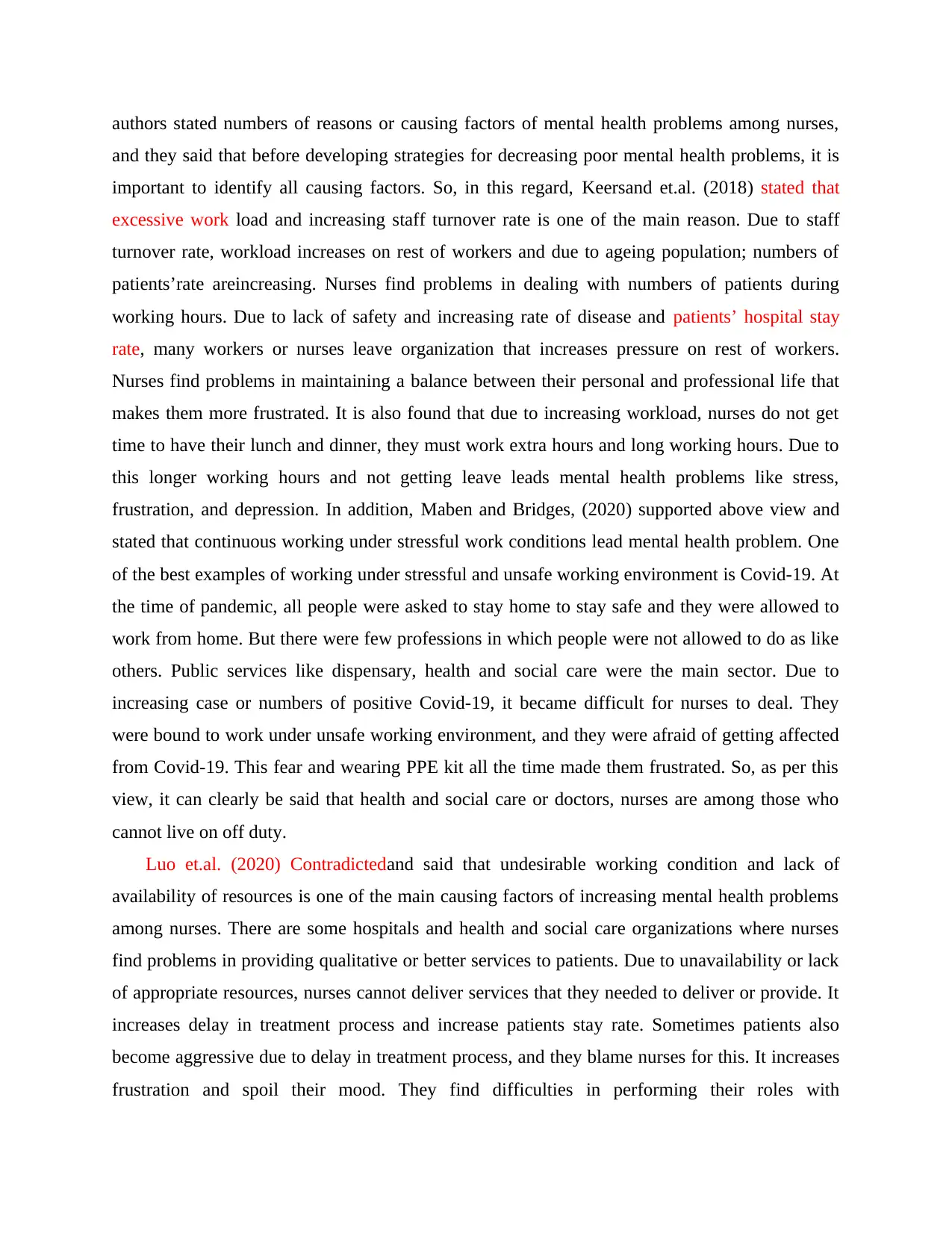
authors stated numbers of reasons or causing factors of mental health problems among nurses,
and they said that before developing strategies for decreasing poor mental health problems, it is
important to identify all causing factors. So, in this regard, Keersand et.al. (2018) stated that
excessive work load and increasing staff turnover rate is one of the main reason. Due to staff
turnover rate, workload increases on rest of workers and due to ageing population; numbers of
patients’rate areincreasing. Nurses find problems in dealing with numbers of patients during
working hours. Due to lack of safety and increasing rate of disease and patients’ hospital stay
rate, many workers or nurses leave organization that increases pressure on rest of workers.
Nurses find problems in maintaining a balance between their personal and professional life that
makes them more frustrated. It is also found that due to increasing workload, nurses do not get
time to have their lunch and dinner, they must work extra hours and long working hours. Due to
this longer working hours and not getting leave leads mental health problems like stress,
frustration, and depression. In addition, Maben and Bridges, (2020) supported above view and
stated that continuous working under stressful work conditions lead mental health problem. One
of the best examples of working under stressful and unsafe working environment is Covid-19. At
the time of pandemic, all people were asked to stay home to stay safe and they were allowed to
work from home. But there were few professions in which people were not allowed to do as like
others. Public services like dispensary, health and social care were the main sector. Due to
increasing case or numbers of positive Covid-19, it became difficult for nurses to deal. They
were bound to work under unsafe working environment, and they were afraid of getting affected
from Covid-19. This fear and wearing PPE kit all the time made them frustrated. So, as per this
view, it can clearly be said that health and social care or doctors, nurses are among those who
cannot live on off duty.
Luo et.al. (2020) Contradictedand said that undesirable working condition and lack of
availability of resources is one of the main causing factors of increasing mental health problems
among nurses. There are some hospitals and health and social care organizations where nurses
find problems in providing qualitative or better services to patients. Due to unavailability or lack
of appropriate resources, nurses cannot deliver services that they needed to deliver or provide. It
increases delay in treatment process and increase patients stay rate. Sometimes patients also
become aggressive due to delay in treatment process, and they blame nurses for this. It increases
frustration and spoil their mood. They find difficulties in performing their roles with
and they said that before developing strategies for decreasing poor mental health problems, it is
important to identify all causing factors. So, in this regard, Keersand et.al. (2018) stated that
excessive work load and increasing staff turnover rate is one of the main reason. Due to staff
turnover rate, workload increases on rest of workers and due to ageing population; numbers of
patients’rate areincreasing. Nurses find problems in dealing with numbers of patients during
working hours. Due to lack of safety and increasing rate of disease and patients’ hospital stay
rate, many workers or nurses leave organization that increases pressure on rest of workers.
Nurses find problems in maintaining a balance between their personal and professional life that
makes them more frustrated. It is also found that due to increasing workload, nurses do not get
time to have their lunch and dinner, they must work extra hours and long working hours. Due to
this longer working hours and not getting leave leads mental health problems like stress,
frustration, and depression. In addition, Maben and Bridges, (2020) supported above view and
stated that continuous working under stressful work conditions lead mental health problem. One
of the best examples of working under stressful and unsafe working environment is Covid-19. At
the time of pandemic, all people were asked to stay home to stay safe and they were allowed to
work from home. But there were few professions in which people were not allowed to do as like
others. Public services like dispensary, health and social care were the main sector. Due to
increasing case or numbers of positive Covid-19, it became difficult for nurses to deal. They
were bound to work under unsafe working environment, and they were afraid of getting affected
from Covid-19. This fear and wearing PPE kit all the time made them frustrated. So, as per this
view, it can clearly be said that health and social care or doctors, nurses are among those who
cannot live on off duty.
Luo et.al. (2020) Contradictedand said that undesirable working condition and lack of
availability of resources is one of the main causing factors of increasing mental health problems
among nurses. There are some hospitals and health and social care organizations where nurses
find problems in providing qualitative or better services to patients. Due to unavailability or lack
of appropriate resources, nurses cannot deliver services that they needed to deliver or provide. It
increases delay in treatment process and increase patients stay rate. Sometimes patients also
become aggressive due to delay in treatment process, and they blame nurses for this. It increases
frustration and spoil their mood. They find difficulties in performing their roles with
Paraphrase This Document
Need a fresh take? Get an instant paraphrase of this document with our AI Paraphraser
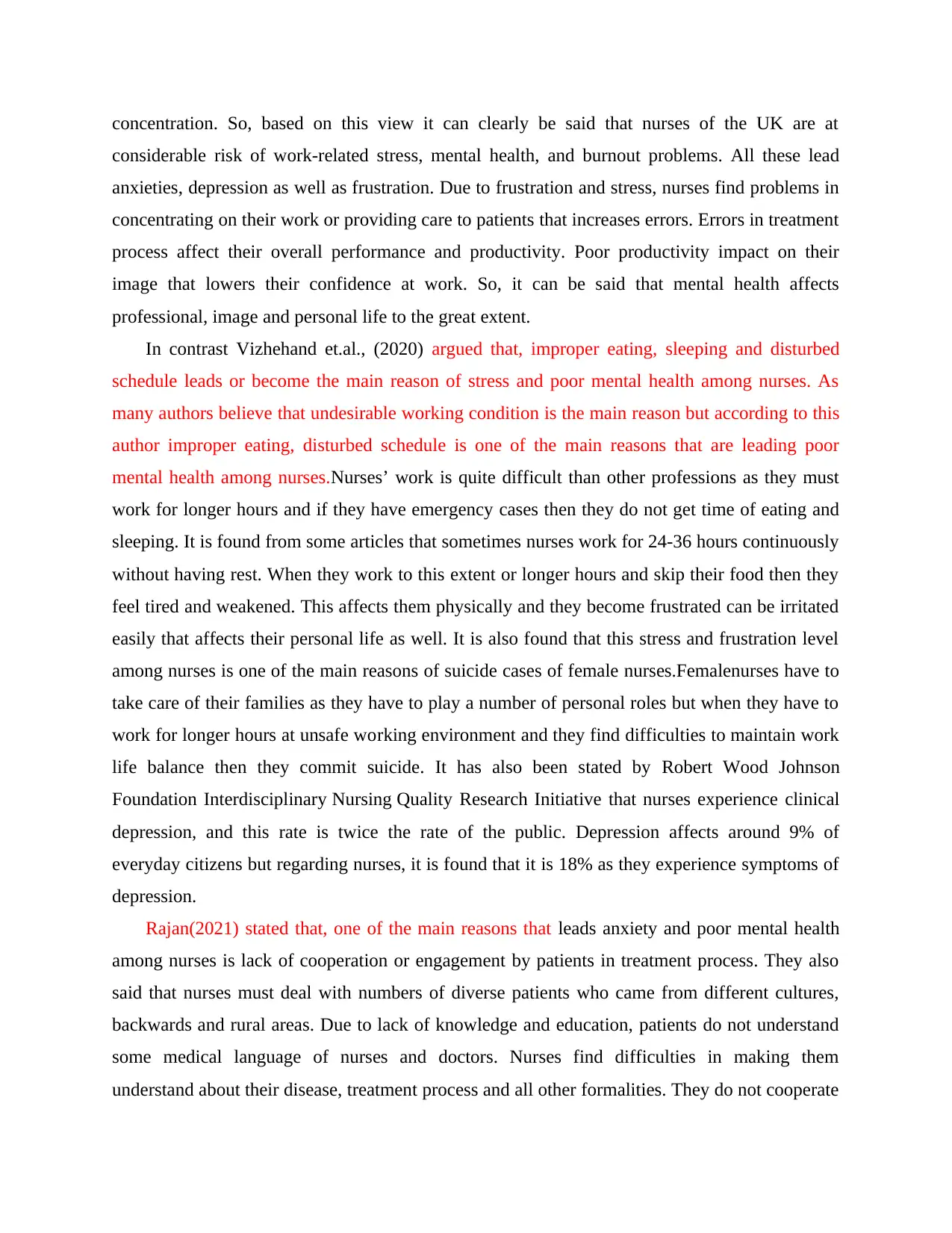
concentration. So, based on this view it can clearly be said that nurses of the UK are at
considerable risk of work-related stress, mental health, and burnout problems. All these lead
anxieties, depression as well as frustration. Due to frustration and stress, nurses find problems in
concentrating on their work or providing care to patients that increases errors. Errors in treatment
process affect their overall performance and productivity. Poor productivity impact on their
image that lowers their confidence at work. So, it can be said that mental health affects
professional, image and personal life to the great extent.
In contrast Vizhehand et.al., (2020) argued that, improper eating, sleeping and disturbed
schedule leads or become the main reason of stress and poor mental health among nurses. As
many authors believe that undesirable working condition is the main reason but according to this
author improper eating, disturbed schedule is one of the main reasons that are leading poor
mental health among nurses.Nurses’ work is quite difficult than other professions as they must
work for longer hours and if they have emergency cases then they do not get time of eating and
sleeping. It is found from some articles that sometimes nurses work for 24-36 hours continuously
without having rest. When they work to this extent or longer hours and skip their food then they
feel tired and weakened. This affects them physically and they become frustrated can be irritated
easily that affects their personal life as well. It is also found that this stress and frustration level
among nurses is one of the main reasons of suicide cases of female nurses.Femalenurses have to
take care of their families as they have to play a number of personal roles but when they have to
work for longer hours at unsafe working environment and they find difficulties to maintain work
life balance then they commit suicide. It has also been stated by Robert Wood Johnson
Foundation Interdisciplinary Nursing Quality Research Initiative that nurses experience clinical
depression, and this rate is twice the rate of the public. Depression affects around 9% of
everyday citizens but regarding nurses, it is found that it is 18% as they experience symptoms of
depression.
Rajan(2021) stated that, one of the main reasons that leads anxiety and poor mental health
among nurses is lack of cooperation or engagement by patients in treatment process. They also
said that nurses must deal with numbers of diverse patients who came from different cultures,
backwards and rural areas. Due to lack of knowledge and education, patients do not understand
some medical language of nurses and doctors. Nurses find difficulties in making them
understand about their disease, treatment process and all other formalities. They do not cooperate
considerable risk of work-related stress, mental health, and burnout problems. All these lead
anxieties, depression as well as frustration. Due to frustration and stress, nurses find problems in
concentrating on their work or providing care to patients that increases errors. Errors in treatment
process affect their overall performance and productivity. Poor productivity impact on their
image that lowers their confidence at work. So, it can be said that mental health affects
professional, image and personal life to the great extent.
In contrast Vizhehand et.al., (2020) argued that, improper eating, sleeping and disturbed
schedule leads or become the main reason of stress and poor mental health among nurses. As
many authors believe that undesirable working condition is the main reason but according to this
author improper eating, disturbed schedule is one of the main reasons that are leading poor
mental health among nurses.Nurses’ work is quite difficult than other professions as they must
work for longer hours and if they have emergency cases then they do not get time of eating and
sleeping. It is found from some articles that sometimes nurses work for 24-36 hours continuously
without having rest. When they work to this extent or longer hours and skip their food then they
feel tired and weakened. This affects them physically and they become frustrated can be irritated
easily that affects their personal life as well. It is also found that this stress and frustration level
among nurses is one of the main reasons of suicide cases of female nurses.Femalenurses have to
take care of their families as they have to play a number of personal roles but when they have to
work for longer hours at unsafe working environment and they find difficulties to maintain work
life balance then they commit suicide. It has also been stated by Robert Wood Johnson
Foundation Interdisciplinary Nursing Quality Research Initiative that nurses experience clinical
depression, and this rate is twice the rate of the public. Depression affects around 9% of
everyday citizens but regarding nurses, it is found that it is 18% as they experience symptoms of
depression.
Rajan(2021) stated that, one of the main reasons that leads anxiety and poor mental health
among nurses is lack of cooperation or engagement by patients in treatment process. They also
said that nurses must deal with numbers of diverse patients who came from different cultures,
backwards and rural areas. Due to lack of knowledge and education, patients do not understand
some medical language of nurses and doctors. Nurses find difficulties in making them
understand about their disease, treatment process and all other formalities. They do not cooperate
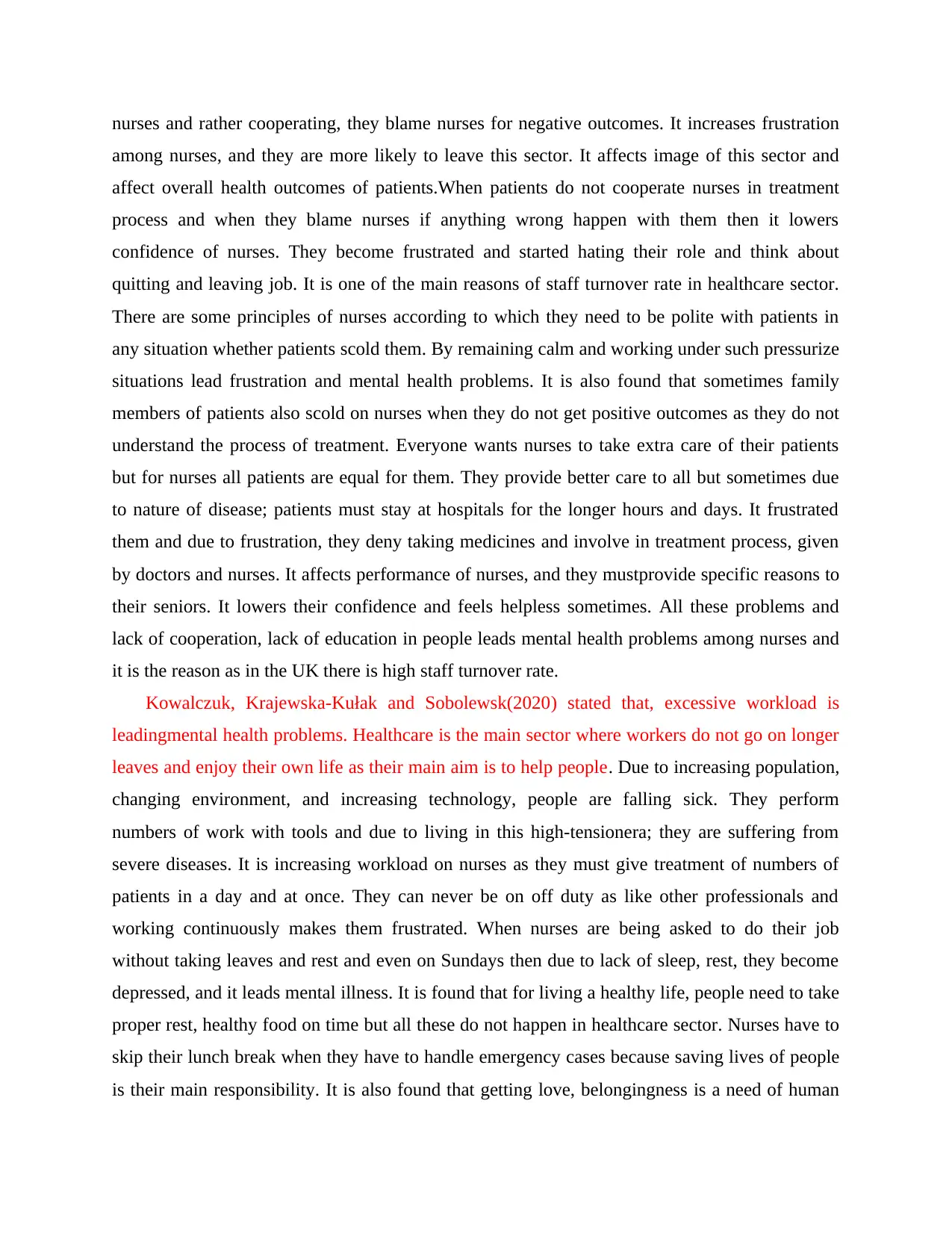
nurses and rather cooperating, they blame nurses for negative outcomes. It increases frustration
among nurses, and they are more likely to leave this sector. It affects image of this sector and
affect overall health outcomes of patients.When patients do not cooperate nurses in treatment
process and when they blame nurses if anything wrong happen with them then it lowers
confidence of nurses. They become frustrated and started hating their role and think about
quitting and leaving job. It is one of the main reasons of staff turnover rate in healthcare sector.
There are some principles of nurses according to which they need to be polite with patients in
any situation whether patients scold them. By remaining calm and working under such pressurize
situations lead frustration and mental health problems. It is also found that sometimes family
members of patients also scold on nurses when they do not get positive outcomes as they do not
understand the process of treatment. Everyone wants nurses to take extra care of their patients
but for nurses all patients are equal for them. They provide better care to all but sometimes due
to nature of disease; patients must stay at hospitals for the longer hours and days. It frustrated
them and due to frustration, they deny taking medicines and involve in treatment process, given
by doctors and nurses. It affects performance of nurses, and they mustprovide specific reasons to
their seniors. It lowers their confidence and feels helpless sometimes. All these problems and
lack of cooperation, lack of education in people leads mental health problems among nurses and
it is the reason as in the UK there is high staff turnover rate.
Kowalczuk, Krajewska-Kułak and Sobolewsk(2020) stated that, excessive workload is
leadingmental health problems. Healthcare is the main sector where workers do not go on longer
leaves and enjoy their own life as their main aim is to help people. Due to increasing population,
changing environment, and increasing technology, people are falling sick. They perform
numbers of work with tools and due to living in this high-tensionera; they are suffering from
severe diseases. It is increasing workload on nurses as they must give treatment of numbers of
patients in a day and at once. They can never be on off duty as like other professionals and
working continuously makes them frustrated. When nurses are being asked to do their job
without taking leaves and rest and even on Sundays then due to lack of sleep, rest, they become
depressed, and it leads mental illness. It is found that for living a healthy life, people need to take
proper rest, healthy food on time but all these do not happen in healthcare sector. Nurses have to
skip their lunch break when they have to handle emergency cases because saving lives of people
is their main responsibility. It is also found that getting love, belongingness is a need of human
among nurses, and they are more likely to leave this sector. It affects image of this sector and
affect overall health outcomes of patients.When patients do not cooperate nurses in treatment
process and when they blame nurses if anything wrong happen with them then it lowers
confidence of nurses. They become frustrated and started hating their role and think about
quitting and leaving job. It is one of the main reasons of staff turnover rate in healthcare sector.
There are some principles of nurses according to which they need to be polite with patients in
any situation whether patients scold them. By remaining calm and working under such pressurize
situations lead frustration and mental health problems. It is also found that sometimes family
members of patients also scold on nurses when they do not get positive outcomes as they do not
understand the process of treatment. Everyone wants nurses to take extra care of their patients
but for nurses all patients are equal for them. They provide better care to all but sometimes due
to nature of disease; patients must stay at hospitals for the longer hours and days. It frustrated
them and due to frustration, they deny taking medicines and involve in treatment process, given
by doctors and nurses. It affects performance of nurses, and they mustprovide specific reasons to
their seniors. It lowers their confidence and feels helpless sometimes. All these problems and
lack of cooperation, lack of education in people leads mental health problems among nurses and
it is the reason as in the UK there is high staff turnover rate.
Kowalczuk, Krajewska-Kułak and Sobolewsk(2020) stated that, excessive workload is
leadingmental health problems. Healthcare is the main sector where workers do not go on longer
leaves and enjoy their own life as their main aim is to help people. Due to increasing population,
changing environment, and increasing technology, people are falling sick. They perform
numbers of work with tools and due to living in this high-tensionera; they are suffering from
severe diseases. It is increasing workload on nurses as they must give treatment of numbers of
patients in a day and at once. They can never be on off duty as like other professionals and
working continuously makes them frustrated. When nurses are being asked to do their job
without taking leaves and rest and even on Sundays then due to lack of sleep, rest, they become
depressed, and it leads mental illness. It is found that for living a healthy life, people need to take
proper rest, healthy food on time but all these do not happen in healthcare sector. Nurses have to
skip their lunch break when they have to handle emergency cases because saving lives of people
is their main responsibility. It is also found that getting love, belongingness is a need of human
⊘ This is a preview!⊘
Do you want full access?
Subscribe today to unlock all pages.

Trusted by 1+ million students worldwide
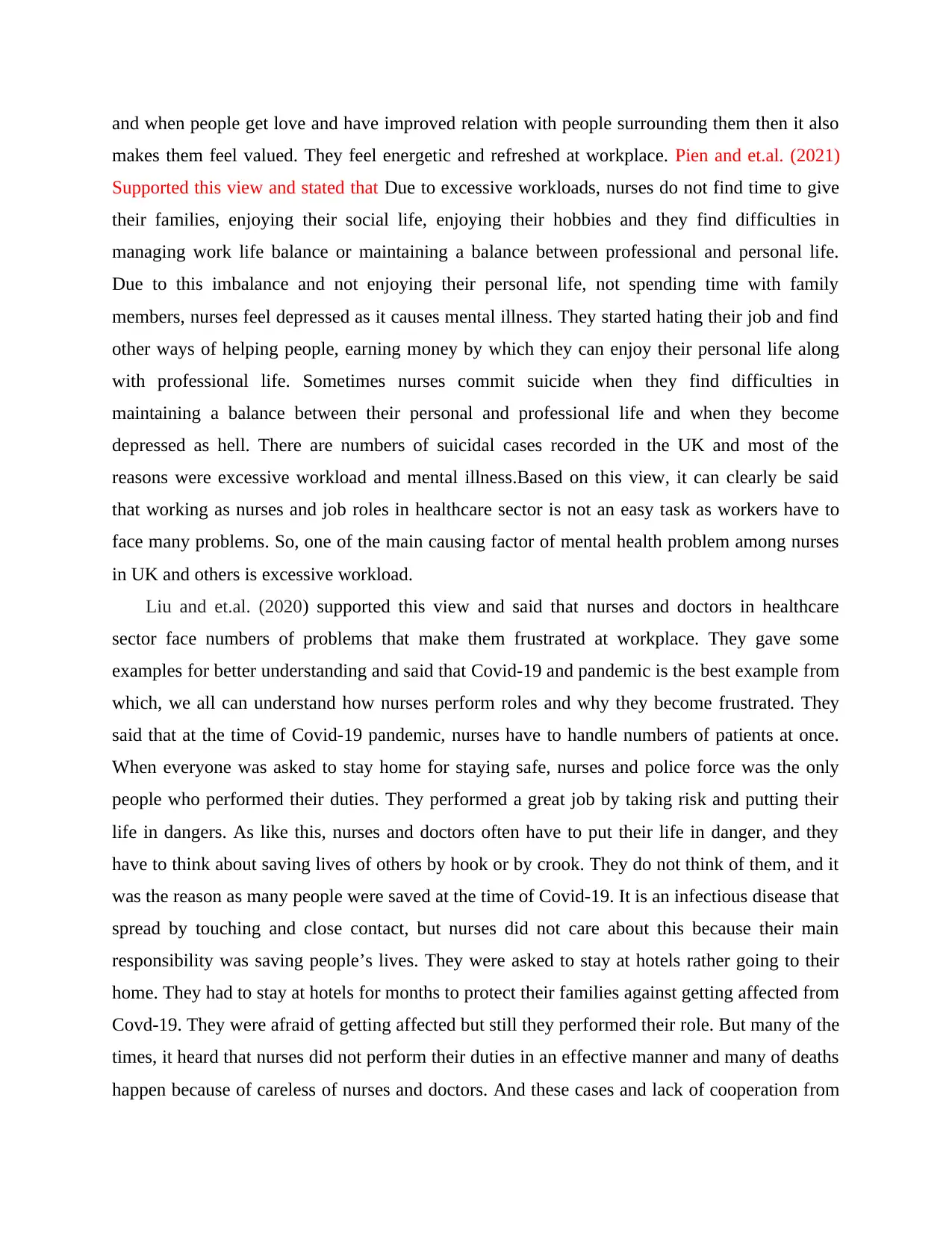
and when people get love and have improved relation with people surrounding them then it also
makes them feel valued. They feel energetic and refreshed at workplace. Pien and et.al. (2021)
Supported this view and stated that Due to excessive workloads, nurses do not find time to give
their families, enjoying their social life, enjoying their hobbies and they find difficulties in
managing work life balance or maintaining a balance between professional and personal life.
Due to this imbalance and not enjoying their personal life, not spending time with family
members, nurses feel depressed as it causes mental illness. They started hating their job and find
other ways of helping people, earning money by which they can enjoy their personal life along
with professional life. Sometimes nurses commit suicide when they find difficulties in
maintaining a balance between their personal and professional life and when they become
depressed as hell. There are numbers of suicidal cases recorded in the UK and most of the
reasons were excessive workload and mental illness.Based on this view, it can clearly be said
that working as nurses and job roles in healthcare sector is not an easy task as workers have to
face many problems. So, one of the main causing factor of mental health problem among nurses
in UK and others is excessive workload.
Liu and et.al. (2020) supported this view and said that nurses and doctors in healthcare
sector face numbers of problems that make them frustrated at workplace. They gave some
examples for better understanding and said that Covid-19 and pandemic is the best example from
which, we all can understand how nurses perform roles and why they become frustrated. They
said that at the time of Covid-19 pandemic, nurses have to handle numbers of patients at once.
When everyone was asked to stay home for staying safe, nurses and police force was the only
people who performed their duties. They performed a great job by taking risk and putting their
life in dangers. As like this, nurses and doctors often have to put their life in danger, and they
have to think about saving lives of others by hook or by crook. They do not think of them, and it
was the reason as many people were saved at the time of Covid-19. It is an infectious disease that
spread by touching and close contact, but nurses did not care about this because their main
responsibility was saving people’s lives. They were asked to stay at hotels rather going to their
home. They had to stay at hotels for months to protect their families against getting affected from
Covd-19. They were afraid of getting affected but still they performed their role. But many of the
times, it heard that nurses did not perform their duties in an effective manner and many of deaths
happen because of careless of nurses and doctors. And these cases and lack of cooperation from
makes them feel valued. They feel energetic and refreshed at workplace. Pien and et.al. (2021)
Supported this view and stated that Due to excessive workloads, nurses do not find time to give
their families, enjoying their social life, enjoying their hobbies and they find difficulties in
managing work life balance or maintaining a balance between professional and personal life.
Due to this imbalance and not enjoying their personal life, not spending time with family
members, nurses feel depressed as it causes mental illness. They started hating their job and find
other ways of helping people, earning money by which they can enjoy their personal life along
with professional life. Sometimes nurses commit suicide when they find difficulties in
maintaining a balance between their personal and professional life and when they become
depressed as hell. There are numbers of suicidal cases recorded in the UK and most of the
reasons were excessive workload and mental illness.Based on this view, it can clearly be said
that working as nurses and job roles in healthcare sector is not an easy task as workers have to
face many problems. So, one of the main causing factor of mental health problem among nurses
in UK and others is excessive workload.
Liu and et.al. (2020) supported this view and said that nurses and doctors in healthcare
sector face numbers of problems that make them frustrated at workplace. They gave some
examples for better understanding and said that Covid-19 and pandemic is the best example from
which, we all can understand how nurses perform roles and why they become frustrated. They
said that at the time of Covid-19 pandemic, nurses have to handle numbers of patients at once.
When everyone was asked to stay home for staying safe, nurses and police force was the only
people who performed their duties. They performed a great job by taking risk and putting their
life in dangers. As like this, nurses and doctors often have to put their life in danger, and they
have to think about saving lives of others by hook or by crook. They do not think of them, and it
was the reason as many people were saved at the time of Covid-19. It is an infectious disease that
spread by touching and close contact, but nurses did not care about this because their main
responsibility was saving people’s lives. They were asked to stay at hotels rather going to their
home. They had to stay at hotels for months to protect their families against getting affected from
Covd-19. They were afraid of getting affected but still they performed their role. But many of the
times, it heard that nurses did not perform their duties in an effective manner and many of deaths
happen because of careless of nurses and doctors. And these cases and lack of cooperation from
Paraphrase This Document
Need a fresh take? Get an instant paraphrase of this document with our AI Paraphraser
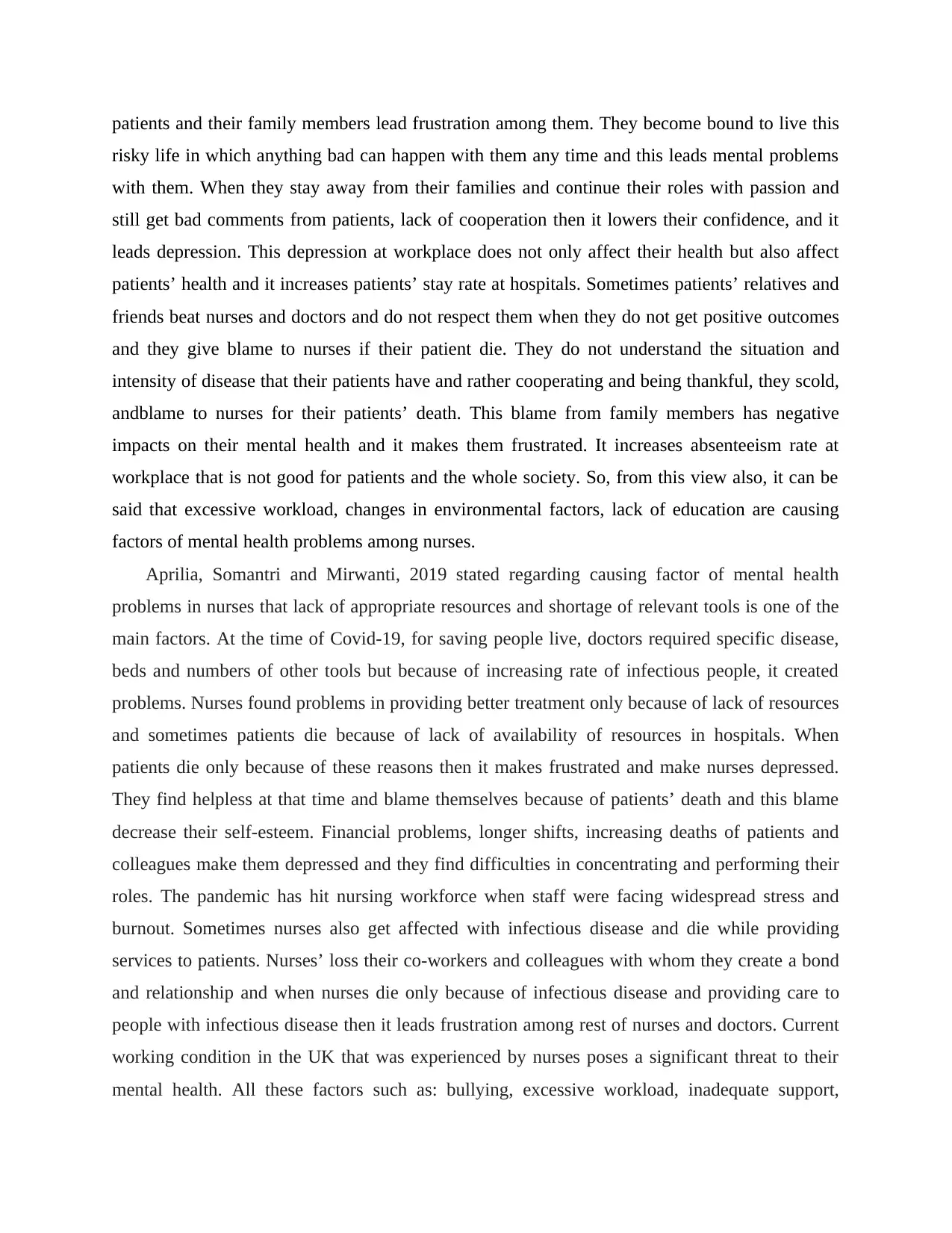
patients and their family members lead frustration among them. They become bound to live this
risky life in which anything bad can happen with them any time and this leads mental problems
with them. When they stay away from their families and continue their roles with passion and
still get bad comments from patients, lack of cooperation then it lowers their confidence, and it
leads depression. This depression at workplace does not only affect their health but also affect
patients’ health and it increases patients’ stay rate at hospitals. Sometimes patients’ relatives and
friends beat nurses and doctors and do not respect them when they do not get positive outcomes
and they give blame to nurses if their patient die. They do not understand the situation and
intensity of disease that their patients have and rather cooperating and being thankful, they scold,
andblame to nurses for their patients’ death. This blame from family members has negative
impacts on their mental health and it makes them frustrated. It increases absenteeism rate at
workplace that is not good for patients and the whole society. So, from this view also, it can be
said that excessive workload, changes in environmental factors, lack of education are causing
factors of mental health problems among nurses.
Aprilia, Somantri and Mirwanti, 2019 stated regarding causing factor of mental health
problems in nurses that lack of appropriate resources and shortage of relevant tools is one of the
main factors. At the time of Covid-19, for saving people live, doctors required specific disease,
beds and numbers of other tools but because of increasing rate of infectious people, it created
problems. Nurses found problems in providing better treatment only because of lack of resources
and sometimes patients die because of lack of availability of resources in hospitals. When
patients die only because of these reasons then it makes frustrated and make nurses depressed.
They find helpless at that time and blame themselves because of patients’ death and this blame
decrease their self-esteem. Financial problems, longer shifts, increasing deaths of patients and
colleagues make them depressed and they find difficulties in concentrating and performing their
roles. The pandemic has hit nursing workforce when staff were facing widespread stress and
burnout. Sometimes nurses also get affected with infectious disease and die while providing
services to patients. Nurses’ loss their co-workers and colleagues with whom they create a bond
and relationship and when nurses die only because of infectious disease and providing care to
people with infectious disease then it leads frustration among rest of nurses and doctors. Current
working condition in the UK that was experienced by nurses poses a significant threat to their
mental health. All these factors such as: bullying, excessive workload, inadequate support,
risky life in which anything bad can happen with them any time and this leads mental problems
with them. When they stay away from their families and continue their roles with passion and
still get bad comments from patients, lack of cooperation then it lowers their confidence, and it
leads depression. This depression at workplace does not only affect their health but also affect
patients’ health and it increases patients’ stay rate at hospitals. Sometimes patients’ relatives and
friends beat nurses and doctors and do not respect them when they do not get positive outcomes
and they give blame to nurses if their patient die. They do not understand the situation and
intensity of disease that their patients have and rather cooperating and being thankful, they scold,
andblame to nurses for their patients’ death. This blame from family members has negative
impacts on their mental health and it makes them frustrated. It increases absenteeism rate at
workplace that is not good for patients and the whole society. So, from this view also, it can be
said that excessive workload, changes in environmental factors, lack of education are causing
factors of mental health problems among nurses.
Aprilia, Somantri and Mirwanti, 2019 stated regarding causing factor of mental health
problems in nurses that lack of appropriate resources and shortage of relevant tools is one of the
main factors. At the time of Covid-19, for saving people live, doctors required specific disease,
beds and numbers of other tools but because of increasing rate of infectious people, it created
problems. Nurses found problems in providing better treatment only because of lack of resources
and sometimes patients die because of lack of availability of resources in hospitals. When
patients die only because of these reasons then it makes frustrated and make nurses depressed.
They find helpless at that time and blame themselves because of patients’ death and this blame
decrease their self-esteem. Financial problems, longer shifts, increasing deaths of patients and
colleagues make them depressed and they find difficulties in concentrating and performing their
roles. The pandemic has hit nursing workforce when staff were facing widespread stress and
burnout. Sometimes nurses also get affected with infectious disease and die while providing
services to patients. Nurses’ loss their co-workers and colleagues with whom they create a bond
and relationship and when nurses die only because of infectious disease and providing care to
people with infectious disease then it leads frustration among rest of nurses and doctors. Current
working condition in the UK that was experienced by nurses poses a significant threat to their
mental health. All these factors such as: bullying, excessive workload, inadequate support,
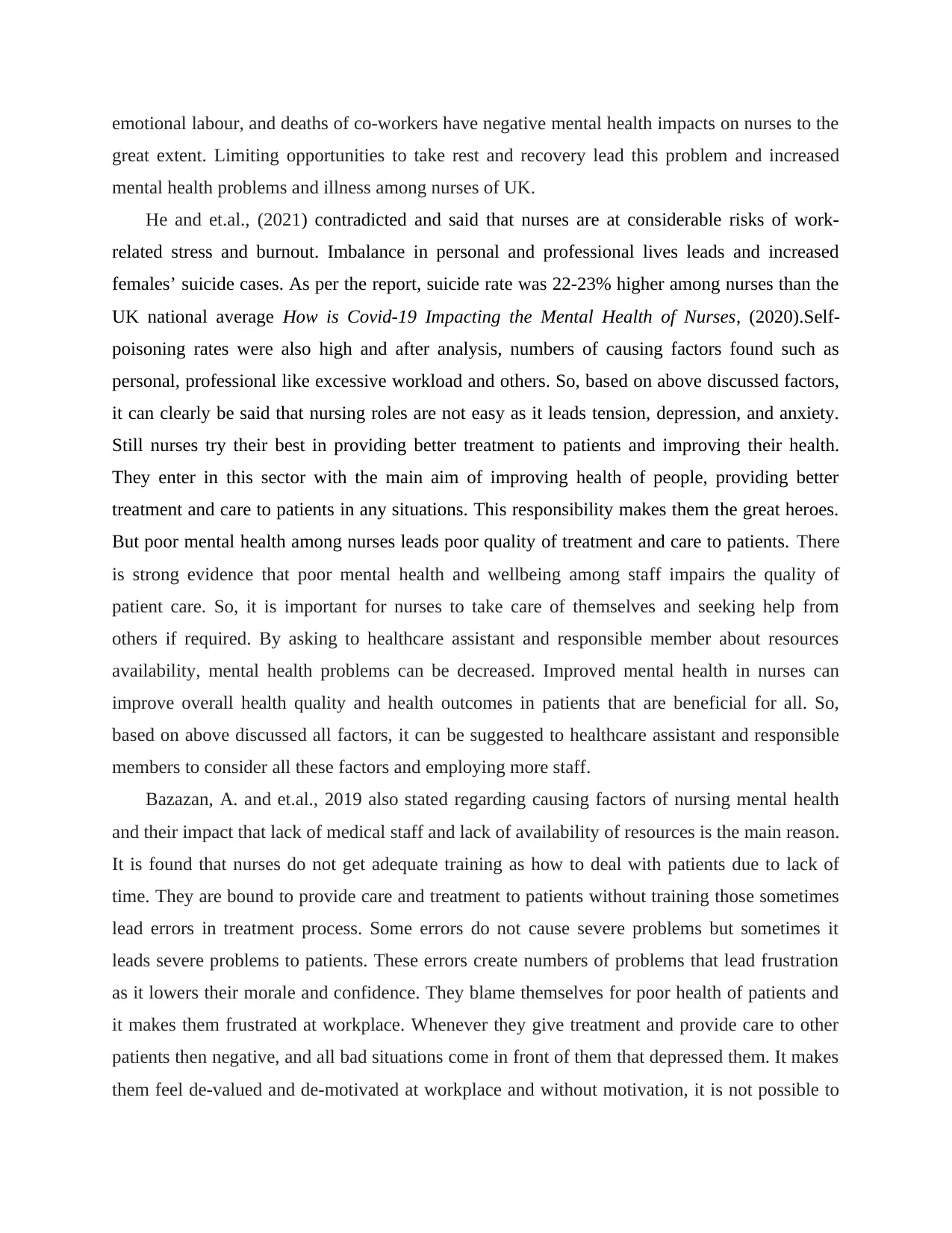
emotional labour, and deaths of co-workers have negative mental health impacts on nurses to the
great extent. Limiting opportunities to take rest and recovery lead this problem and increased
mental health problems and illness among nurses of UK.
He and et.al., (2021) contradicted and said that nurses are at considerable risks of work-
related stress and burnout. Imbalance in personal and professional lives leads and increased
females’ suicide cases. As per the report, suicide rate was 22-23% higher among nurses than the
UK national average How is Covid-19 Impacting the Mental Health of Nurses, (2020).Self-
poisoning rates were also high and after analysis, numbers of causing factors found such as
personal, professional like excessive workload and others. So, based on above discussed factors,
it can clearly be said that nursing roles are not easy as it leads tension, depression, and anxiety.
Still nurses try their best in providing better treatment to patients and improving their health.
They enter in this sector with the main aim of improving health of people, providing better
treatment and care to patients in any situations. This responsibility makes them the great heroes.
But poor mental health among nurses leads poor quality of treatment and care to patients. There
is strong evidence that poor mental health and wellbeing among staff impairs the quality of
patient care. So, it is important for nurses to take care of themselves and seeking help from
others if required. By asking to healthcare assistant and responsible member about resources
availability, mental health problems can be decreased. Improved mental health in nurses can
improve overall health quality and health outcomes in patients that are beneficial for all. So,
based on above discussed all factors, it can be suggested to healthcare assistant and responsible
members to consider all these factors and employing more staff.
Bazazan, A. and et.al., 2019 also stated regarding causing factors of nursing mental health
and their impact that lack of medical staff and lack of availability of resources is the main reason.
It is found that nurses do not get adequate training as how to deal with patients due to lack of
time. They are bound to provide care and treatment to patients without training those sometimes
lead errors in treatment process. Some errors do not cause severe problems but sometimes it
leads severe problems to patients. These errors create numbers of problems that lead frustration
as it lowers their morale and confidence. They blame themselves for poor health of patients and
it makes them frustrated at workplace. Whenever they give treatment and provide care to other
patients then negative, and all bad situations come in front of them that depressed them. It makes
them feel de-valued and de-motivated at workplace and without motivation, it is not possible to
great extent. Limiting opportunities to take rest and recovery lead this problem and increased
mental health problems and illness among nurses of UK.
He and et.al., (2021) contradicted and said that nurses are at considerable risks of work-
related stress and burnout. Imbalance in personal and professional lives leads and increased
females’ suicide cases. As per the report, suicide rate was 22-23% higher among nurses than the
UK national average How is Covid-19 Impacting the Mental Health of Nurses, (2020).Self-
poisoning rates were also high and after analysis, numbers of causing factors found such as
personal, professional like excessive workload and others. So, based on above discussed factors,
it can clearly be said that nursing roles are not easy as it leads tension, depression, and anxiety.
Still nurses try their best in providing better treatment to patients and improving their health.
They enter in this sector with the main aim of improving health of people, providing better
treatment and care to patients in any situations. This responsibility makes them the great heroes.
But poor mental health among nurses leads poor quality of treatment and care to patients. There
is strong evidence that poor mental health and wellbeing among staff impairs the quality of
patient care. So, it is important for nurses to take care of themselves and seeking help from
others if required. By asking to healthcare assistant and responsible member about resources
availability, mental health problems can be decreased. Improved mental health in nurses can
improve overall health quality and health outcomes in patients that are beneficial for all. So,
based on above discussed all factors, it can be suggested to healthcare assistant and responsible
members to consider all these factors and employing more staff.
Bazazan, A. and et.al., 2019 also stated regarding causing factors of nursing mental health
and their impact that lack of medical staff and lack of availability of resources is the main reason.
It is found that nurses do not get adequate training as how to deal with patients due to lack of
time. They are bound to provide care and treatment to patients without training those sometimes
lead errors in treatment process. Some errors do not cause severe problems but sometimes it
leads severe problems to patients. These errors create numbers of problems that lead frustration
as it lowers their morale and confidence. They blame themselves for poor health of patients and
it makes them frustrated at workplace. Whenever they give treatment and provide care to other
patients then negative, and all bad situations come in front of them that depressed them. It makes
them feel de-valued and de-motivated at workplace and without motivation, it is not possible to
⊘ This is a preview!⊘
Do you want full access?
Subscribe today to unlock all pages.

Trusted by 1+ million students worldwide
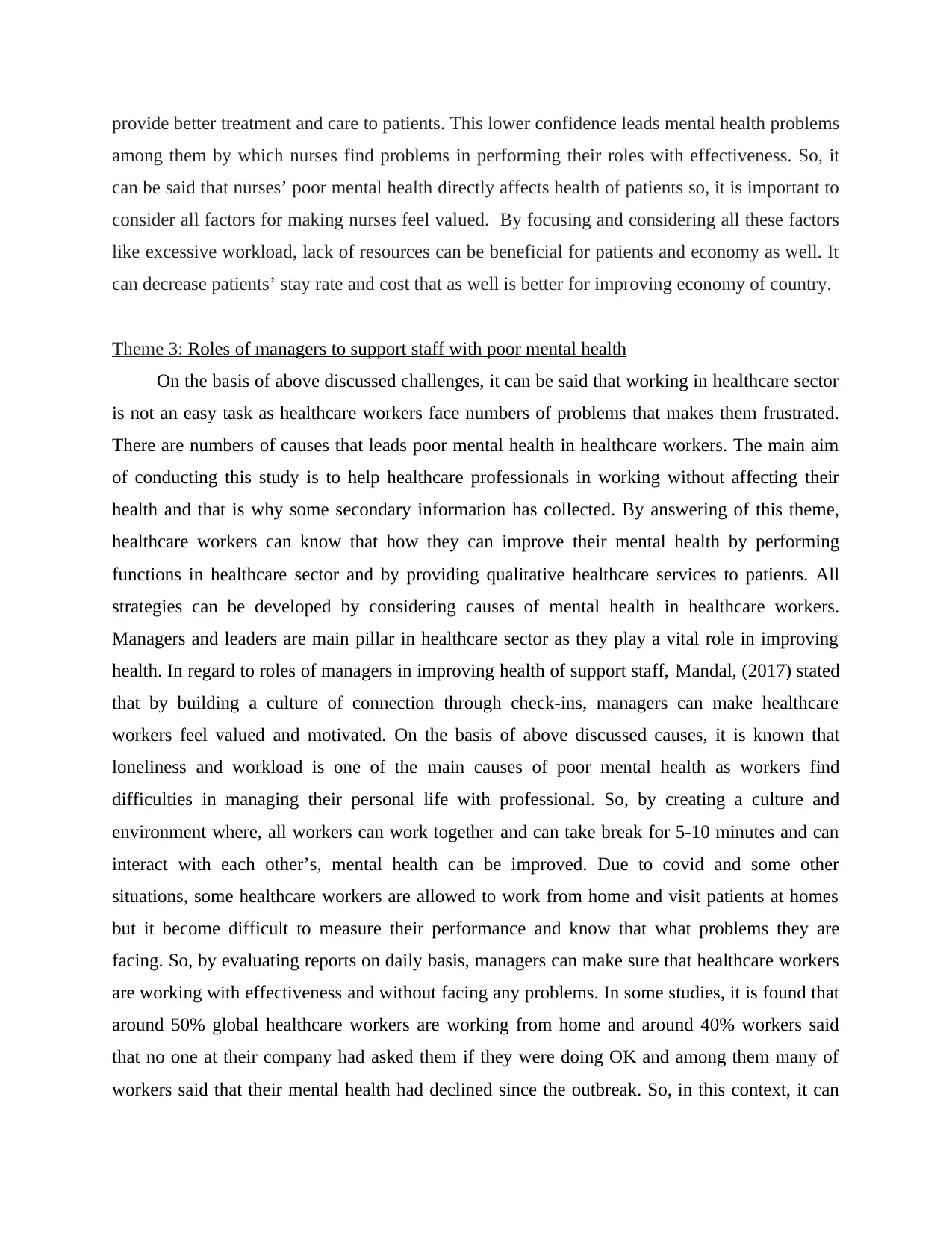
provide better treatment and care to patients. This lower confidence leads mental health problems
among them by which nurses find problems in performing their roles with effectiveness. So, it
can be said that nurses’ poor mental health directly affects health of patients so, it is important to
consider all factors for making nurses feel valued. By focusing and considering all these factors
like excessive workload, lack of resources can be beneficial for patients and economy as well. It
can decrease patients’ stay rate and cost that as well is better for improving economy of country.
Theme 3: Roles of managers to support staff with poor mental health
On the basis of above discussed challenges, it can be said that working in healthcare sector
is not an easy task as healthcare workers face numbers of problems that makes them frustrated.
There are numbers of causes that leads poor mental health in healthcare workers. The main aim
of conducting this study is to help healthcare professionals in working without affecting their
health and that is why some secondary information has collected. By answering of this theme,
healthcare workers can know that how they can improve their mental health by performing
functions in healthcare sector and by providing qualitative healthcare services to patients. All
strategies can be developed by considering causes of mental health in healthcare workers.
Managers and leaders are main pillar in healthcare sector as they play a vital role in improving
health. In regard to roles of managers in improving health of support staff, Mandal, (2017) stated
that by building a culture of connection through check-ins, managers can make healthcare
workers feel valued and motivated. On the basis of above discussed causes, it is known that
loneliness and workload is one of the main causes of poor mental health as workers find
difficulties in managing their personal life with professional. So, by creating a culture and
environment where, all workers can work together and can take break for 5-10 minutes and can
interact with each other’s, mental health can be improved. Due to covid and some other
situations, some healthcare workers are allowed to work from home and visit patients at homes
but it become difficult to measure their performance and know that what problems they are
facing. So, by evaluating reports on daily basis, managers can make sure that healthcare workers
are working with effectiveness and without facing any problems. In some studies, it is found that
around 50% global healthcare workers are working from home and around 40% workers said
that no one at their company had asked them if they were doing OK and among them many of
workers said that their mental health had declined since the outbreak. So, in this context, it can
among them by which nurses find problems in performing their roles with effectiveness. So, it
can be said that nurses’ poor mental health directly affects health of patients so, it is important to
consider all factors for making nurses feel valued. By focusing and considering all these factors
like excessive workload, lack of resources can be beneficial for patients and economy as well. It
can decrease patients’ stay rate and cost that as well is better for improving economy of country.
Theme 3: Roles of managers to support staff with poor mental health
On the basis of above discussed challenges, it can be said that working in healthcare sector
is not an easy task as healthcare workers face numbers of problems that makes them frustrated.
There are numbers of causes that leads poor mental health in healthcare workers. The main aim
of conducting this study is to help healthcare professionals in working without affecting their
health and that is why some secondary information has collected. By answering of this theme,
healthcare workers can know that how they can improve their mental health by performing
functions in healthcare sector and by providing qualitative healthcare services to patients. All
strategies can be developed by considering causes of mental health in healthcare workers.
Managers and leaders are main pillar in healthcare sector as they play a vital role in improving
health. In regard to roles of managers in improving health of support staff, Mandal, (2017) stated
that by building a culture of connection through check-ins, managers can make healthcare
workers feel valued and motivated. On the basis of above discussed causes, it is known that
loneliness and workload is one of the main causes of poor mental health as workers find
difficulties in managing their personal life with professional. So, by creating a culture and
environment where, all workers can work together and can take break for 5-10 minutes and can
interact with each other’s, mental health can be improved. Due to covid and some other
situations, some healthcare workers are allowed to work from home and visit patients at homes
but it become difficult to measure their performance and know that what problems they are
facing. So, by evaluating reports on daily basis, managers can make sure that healthcare workers
are working with effectiveness and without facing any problems. In some studies, it is found that
around 50% global healthcare workers are working from home and around 40% workers said
that no one at their company had asked them if they were doing OK and among them many of
workers said that their mental health had declined since the outbreak. So, in this context, it can
Paraphrase This Document
Need a fresh take? Get an instant paraphrase of this document with our AI Paraphraser
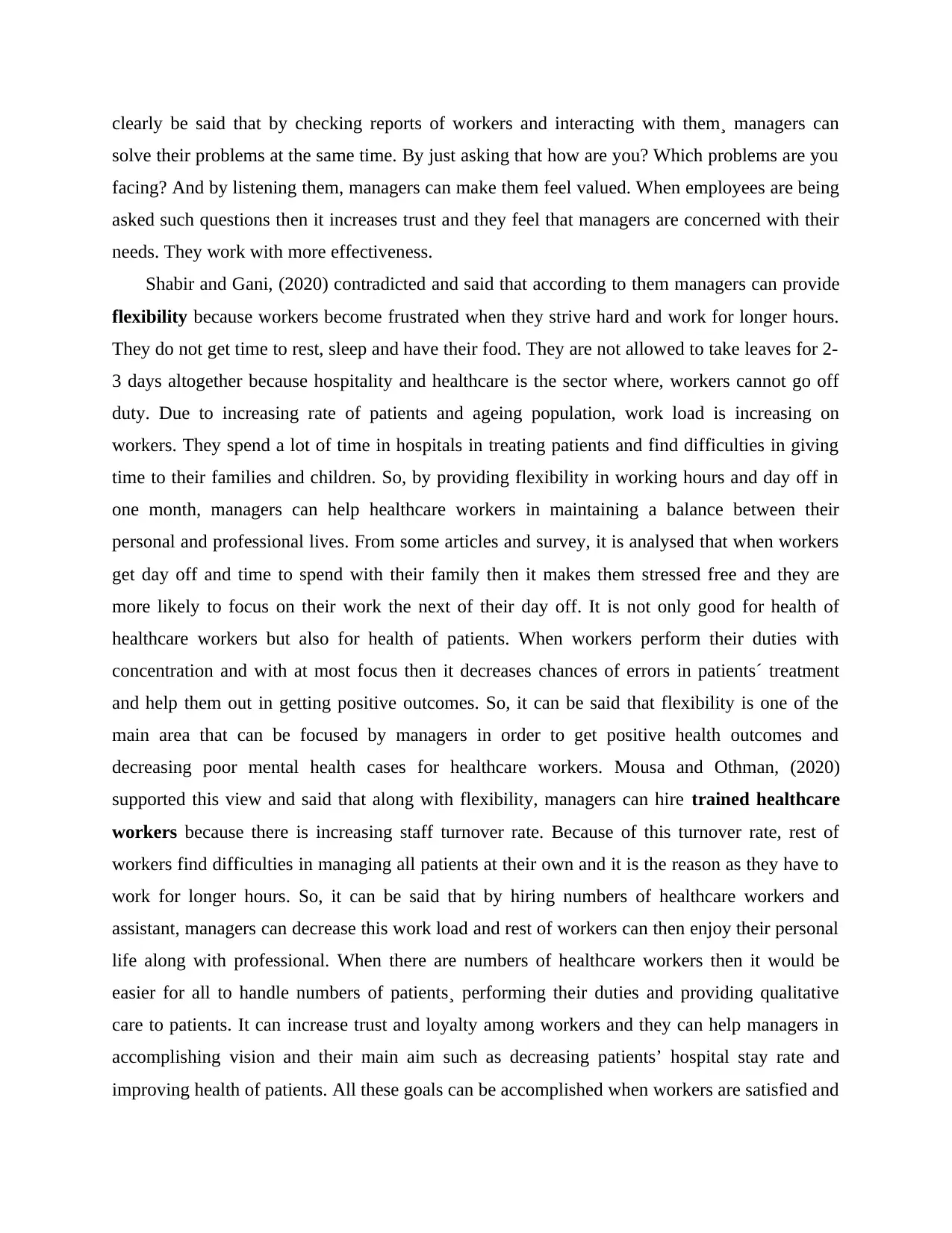
clearly be said that by checking reports of workers and interacting with them¸ managers can
solve their problems at the same time. By just asking that how are you? Which problems are you
facing? And by listening them, managers can make them feel valued. When employees are being
asked such questions then it increases trust and they feel that managers are concerned with their
needs. They work with more effectiveness.
Shabir and Gani, (2020) contradicted and said that according to them managers can provide
flexibility because workers become frustrated when they strive hard and work for longer hours.
They do not get time to rest, sleep and have their food. They are not allowed to take leaves for 2-
3 days altogether because hospitality and healthcare is the sector where, workers cannot go off
duty. Due to increasing rate of patients and ageing population, work load is increasing on
workers. They spend a lot of time in hospitals in treating patients and find difficulties in giving
time to their families and children. So, by providing flexibility in working hours and day off in
one month, managers can help healthcare workers in maintaining a balance between their
personal and professional lives. From some articles and survey, it is analysed that when workers
get day off and time to spend with their family then it makes them stressed free and they are
more likely to focus on their work the next of their day off. It is not only good for health of
healthcare workers but also for health of patients. When workers perform their duties with
concentration and with at most focus then it decreases chances of errors in patients´ treatment
and help them out in getting positive outcomes. So, it can be said that flexibility is one of the
main area that can be focused by managers in order to get positive health outcomes and
decreasing poor mental health cases for healthcare workers. Mousa and Othman, (2020)
supported this view and said that along with flexibility, managers can hire trained healthcare
workers because there is increasing staff turnover rate. Because of this turnover rate, rest of
workers find difficulties in managing all patients at their own and it is the reason as they have to
work for longer hours. So, it can be said that by hiring numbers of healthcare workers and
assistant, managers can decrease this work load and rest of workers can then enjoy their personal
life along with professional. When there are numbers of healthcare workers then it would be
easier for all to handle numbers of patients¸ performing their duties and providing qualitative
care to patients. It can increase trust and loyalty among workers and they can help managers in
accomplishing vision and their main aim such as decreasing patients’ hospital stay rate and
improving health of patients. All these goals can be accomplished when workers are satisfied and
solve their problems at the same time. By just asking that how are you? Which problems are you
facing? And by listening them, managers can make them feel valued. When employees are being
asked such questions then it increases trust and they feel that managers are concerned with their
needs. They work with more effectiveness.
Shabir and Gani, (2020) contradicted and said that according to them managers can provide
flexibility because workers become frustrated when they strive hard and work for longer hours.
They do not get time to rest, sleep and have their food. They are not allowed to take leaves for 2-
3 days altogether because hospitality and healthcare is the sector where, workers cannot go off
duty. Due to increasing rate of patients and ageing population, work load is increasing on
workers. They spend a lot of time in hospitals in treating patients and find difficulties in giving
time to their families and children. So, by providing flexibility in working hours and day off in
one month, managers can help healthcare workers in maintaining a balance between their
personal and professional lives. From some articles and survey, it is analysed that when workers
get day off and time to spend with their family then it makes them stressed free and they are
more likely to focus on their work the next of their day off. It is not only good for health of
healthcare workers but also for health of patients. When workers perform their duties with
concentration and with at most focus then it decreases chances of errors in patients´ treatment
and help them out in getting positive outcomes. So, it can be said that flexibility is one of the
main area that can be focused by managers in order to get positive health outcomes and
decreasing poor mental health cases for healthcare workers. Mousa and Othman, (2020)
supported this view and said that along with flexibility, managers can hire trained healthcare
workers because there is increasing staff turnover rate. Because of this turnover rate, rest of
workers find difficulties in managing all patients at their own and it is the reason as they have to
work for longer hours. So, it can be said that by hiring numbers of healthcare workers and
assistant, managers can decrease this work load and rest of workers can then enjoy their personal
life along with professional. When there are numbers of healthcare workers then it would be
easier for all to handle numbers of patients¸ performing their duties and providing qualitative
care to patients. It can increase trust and loyalty among workers and they can help managers in
accomplishing vision and their main aim such as decreasing patients’ hospital stay rate and
improving health of patients. All these goals can be accomplished when workers are satisfied and
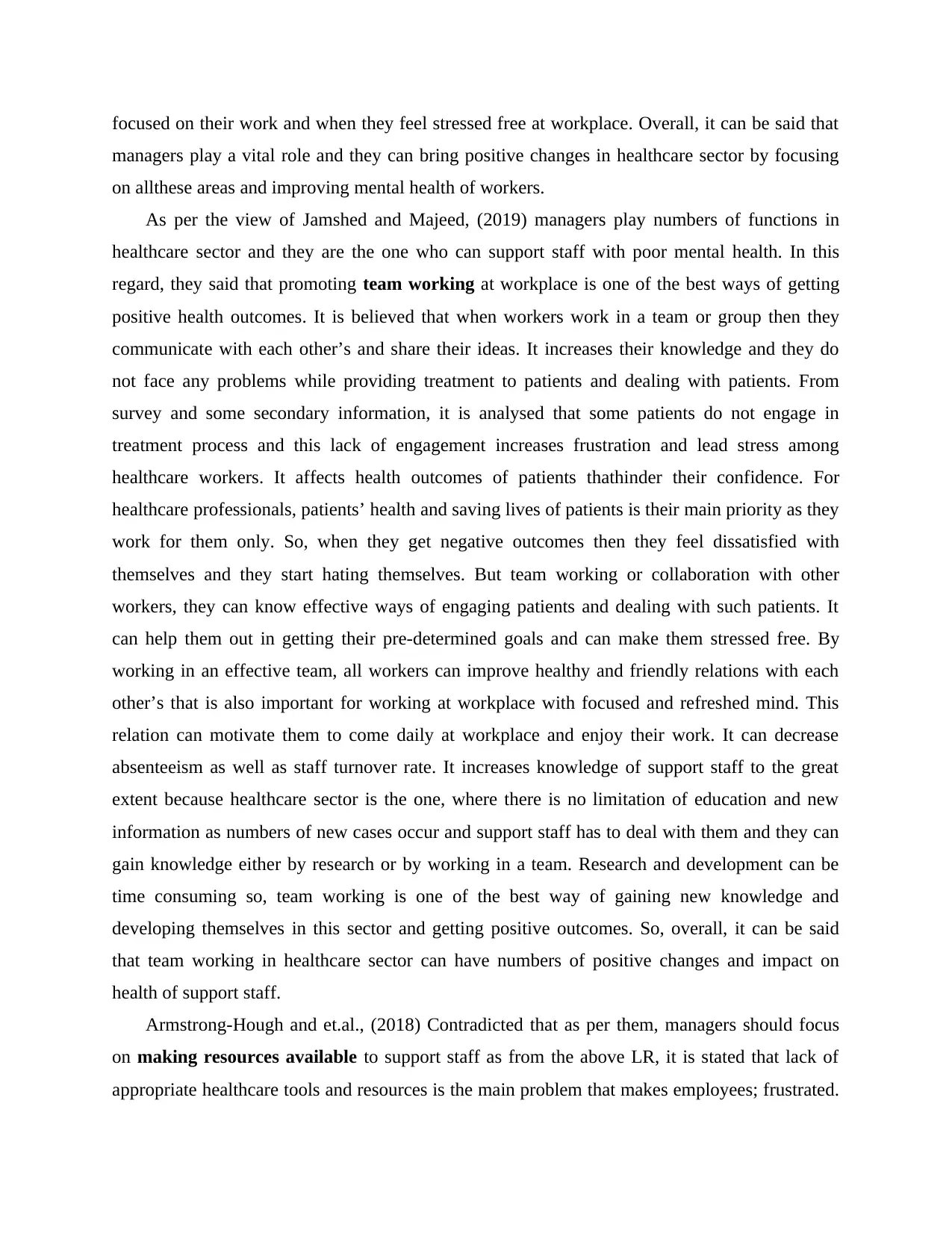
focused on their work and when they feel stressed free at workplace. Overall, it can be said that
managers play a vital role and they can bring positive changes in healthcare sector by focusing
on allthese areas and improving mental health of workers.
As per the view of Jamshed and Majeed, (2019) managers play numbers of functions in
healthcare sector and they are the one who can support staff with poor mental health. In this
regard, they said that promoting team working at workplace is one of the best ways of getting
positive health outcomes. It is believed that when workers work in a team or group then they
communicate with each other’s and share their ideas. It increases their knowledge and they do
not face any problems while providing treatment to patients and dealing with patients. From
survey and some secondary information, it is analysed that some patients do not engage in
treatment process and this lack of engagement increases frustration and lead stress among
healthcare workers. It affects health outcomes of patients thathinder their confidence. For
healthcare professionals, patients’ health and saving lives of patients is their main priority as they
work for them only. So, when they get negative outcomes then they feel dissatisfied with
themselves and they start hating themselves. But team working or collaboration with other
workers, they can know effective ways of engaging patients and dealing with such patients. It
can help them out in getting their pre-determined goals and can make them stressed free. By
working in an effective team, all workers can improve healthy and friendly relations with each
other’s that is also important for working at workplace with focused and refreshed mind. This
relation can motivate them to come daily at workplace and enjoy their work. It can decrease
absenteeism as well as staff turnover rate. It increases knowledge of support staff to the great
extent because healthcare sector is the one, where there is no limitation of education and new
information as numbers of new cases occur and support staff has to deal with them and they can
gain knowledge either by research or by working in a team. Research and development can be
time consuming so, team working is one of the best way of gaining new knowledge and
developing themselves in this sector and getting positive outcomes. So, overall, it can be said
that team working in healthcare sector can have numbers of positive changes and impact on
health of support staff.
Armstrong-Hough and et.al., (2018) Contradicted that as per them, managers should focus
on making resources available to support staff as from the above LR, it is stated that lack of
appropriate healthcare tools and resources is the main problem that makes employees; frustrated.
managers play a vital role and they can bring positive changes in healthcare sector by focusing
on allthese areas and improving mental health of workers.
As per the view of Jamshed and Majeed, (2019) managers play numbers of functions in
healthcare sector and they are the one who can support staff with poor mental health. In this
regard, they said that promoting team working at workplace is one of the best ways of getting
positive health outcomes. It is believed that when workers work in a team or group then they
communicate with each other’s and share their ideas. It increases their knowledge and they do
not face any problems while providing treatment to patients and dealing with patients. From
survey and some secondary information, it is analysed that some patients do not engage in
treatment process and this lack of engagement increases frustration and lead stress among
healthcare workers. It affects health outcomes of patients thathinder their confidence. For
healthcare professionals, patients’ health and saving lives of patients is their main priority as they
work for them only. So, when they get negative outcomes then they feel dissatisfied with
themselves and they start hating themselves. But team working or collaboration with other
workers, they can know effective ways of engaging patients and dealing with such patients. It
can help them out in getting their pre-determined goals and can make them stressed free. By
working in an effective team, all workers can improve healthy and friendly relations with each
other’s that is also important for working at workplace with focused and refreshed mind. This
relation can motivate them to come daily at workplace and enjoy their work. It can decrease
absenteeism as well as staff turnover rate. It increases knowledge of support staff to the great
extent because healthcare sector is the one, where there is no limitation of education and new
information as numbers of new cases occur and support staff has to deal with them and they can
gain knowledge either by research or by working in a team. Research and development can be
time consuming so, team working is one of the best way of gaining new knowledge and
developing themselves in this sector and getting positive outcomes. So, overall, it can be said
that team working in healthcare sector can have numbers of positive changes and impact on
health of support staff.
Armstrong-Hough and et.al., (2018) Contradicted that as per them, managers should focus
on making resources available to support staff as from the above LR, it is stated that lack of
appropriate healthcare tools and resources is the main problem that makes employees; frustrated.
⊘ This is a preview!⊘
Do you want full access?
Subscribe today to unlock all pages.

Trusted by 1+ million students worldwide
1 out of 20
Related Documents
Your All-in-One AI-Powered Toolkit for Academic Success.
+13062052269
info@desklib.com
Available 24*7 on WhatsApp / Email
![[object Object]](/_next/static/media/star-bottom.7253800d.svg)
Unlock your academic potential
Copyright © 2020–2026 A2Z Services. All Rights Reserved. Developed and managed by ZUCOL.





